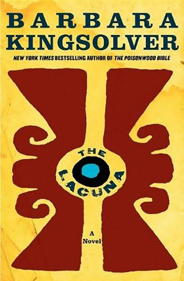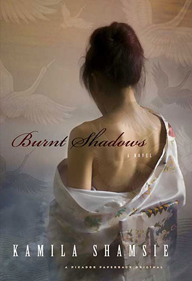-
March 23, 2010
Quarterfinals
-
Commentary by
Kevin Guilfoile & John Warner
-
Today’s Winner:
1The Lacuna
Kevin: John, I know you weren’t crazy about either of these books, and I didn’t read them. And given that we have the president of the National Book Critics Circle declaring The Lacuna the winner, I’ll just say congratulations to Barbara Kingsolver. There is nothing I can add to the wisdom of this thoughtful decision.
So far this year, you and I have been uncharacteristically on-topic. Things have been awfully genteel, as well, which is a nice change of pace. That hasn’t been the case everywhere in the book world, however. Do you know who has been ramping up the trash talk lately? Mega-bestselling author of The Notebook Nicholas Sparks.
I know, right?
Last week he gave an interview between the bookstore stacks to a writer from USA Today. As they walked and talked they came across a collection of Cormac McCarthy’s novels.
The context of this interview was the impending release of the movie version of his 2009 novel The Last Song, which was, almost from its inception, conceived by Disney as an acting vehicle for Miley Cyrus. Cyrus even had some early input into the story and chose the name of the character in the novel that she would eventually play in the film.“Horrible,” [Sparks] says, looking at Blood Meridian. “This is probably the most pulpy, overwrought, melodramatic cowboy vs. Indians story ever written…. My own opinion is: dark—easy to write. Easy!” he says. “I find no challenge in it.”
Now my point is not to snipe at Sparks for this project’s overt commercialism. I don’t insult authors for writing popular books, and I don’t insult readers for liking books that are popular. Frankly, writing a novel that might inspire Hannah Montana fans to read strikes me as a rather noble pursuit (although that goal was possibly undermined when, in the course of the interview, which was being conducted jointly with the actress, Miley admitted that after her initial contributions to writing The Last Song, she never got around to reading it).
Here’s some more Sparks from the same discussion:
It would seem that Nicholas Sparks has a perception of his body of work similar to the perception I have of my own actual body, which I believe is leaner, more muscular, and altogether more like Ernest Hemingway’s than any objective observer would ever claim.“What is the purpose of what I do? These are love stories. They went from (Greek tragedies), to Shakespeare’s Romeo and Juliet, then Jane Austen did it, put a new human twist on it. Hemingway did it with A Farewell to Arms.” That’s one of his favorites, and he points it out as he walks the aisles of the bookstore…. “A Farewell to Arms, by Hemingway. Good stuff. That’s what I write,” he says, putting it back. “That’s what I write.”
Since Sparks seemed to have praise only for books he had been forced to read more than two decades ago in school, the interviewer pressed him on contemporary novels he likes. What’s his favorite tale of youth, for instance?
OK, now you want to say maybe he was having a bad day. Maybe he got off on the wrong foot with this particular reporter who selected quotes to make him look bad. But here he is in an interview from February at the premiere of another Sparks book-to-film, Dear John:“I think A Walk to Remember,” he says, citing his own novel. “That’s my version of a coming-of-age.” He pauses and adds: “You have to say To Kill Mockingbird is an all-time classic.” Asked what he likes in his own genre, Sparks replies: “There are no authors in my genre. No one is doing what I do.”
Did he really just call Alice Sebold a pussy because only one of her three novels have so far been made into major motion pictures? Once again, what novels does Sparks like?“There’s a really big difference between having one novel made into a film and having seven. Alice Sebold had The Lovely Bones. Is her life changed now?” Sparks asked. “But when you start getting over six, seven, we’re moving into territory where not a lot of people go.”
So John, what do you think Nicholas Sparks is up to all of the sudden? Is he having some kind of mid-career crisis where he’s bored with having millions of readers who adore him and he now wants to make a play for the attention of the handful of people, people like Judge Ciabattari here, who can confer not just love and riches but lasting respect? Is he trying to redefine himself as some sort of bad boy of American letters? The Badass Brawler of the Billet-doux? Is it possible he hasn’t liked a single novel in the last 20 years that wasn’t written by him? Has he always been a wildly ungenerous gasbag and I just haven’t been paying attention?“The Notebook is a good novel. There are no flaws with that novel,” he said. “That’s a novel that will stay around for a long, long time. That’s a novel that is taught in schools—that is out in Cliffs Notes. Classics just choose themselves.”
John: As I confessed in the first round, I didn’t manage to read past page 30 of The Lacuna, but I actively disliked Burnt Shadows, so I too will offer a simple concurring opinion with today’s judgment. I will note, however, that Barbara Kingsolver has gotten the Cliffs Notes treatment for two of her books.
And who wouldn’t love to see a little mano-a-mano action between Cormac McCarthy and Nicholas Sparks? I’m thinking some close-quarters knife action. Sparks may have almost 30 years’ advantage on McCarthy, but I know where my money would be.
It’s interesting that Sparks’s recent mouth running hasn’t come in for all that much attention given that when literary feuds break out, they tend to draw plenty of interested eyeballs. Earlier this year Alice Hoffman took to Twitter to work over a critic who she felt had given away too much of the plot of her novel, The Story Sisters. (Carolyn Kellogg, one of our Quarterfinals judges, has a wrap-up here.)
Hoffman called the reviewer a “moron” and tweeted her phone number, encouraging followers to call and exact some telephonic retribution. You’ve got to admire the spunk, but she apparently got the number wrong.
I think Sparks declaring Blood Meridian “horrible” should have caused more kerfuffle, or maybe a hullaballo. If not that, a contretemps? Ruckus? Donnybrook?
Maybe Sparks is pissed that while he racks up enormous sales he gets not so much critical respect. A quick, but I think accurate, search reveals that Sparks has only been reviewed once in the New York Times, and as part of a fiction chronicle at that.
And the first line (emphasis mine):
It also calls the dialog “knuckle-bitingly bad,” which would have made me more pissed than the romance tag, if I were Sparks.Sparks’s latest romance revisits two characters he introduced in an earlier novel, True Believer.
This also makes me think of something that occurs to me just about every time I’m in a bookstore, which is that the books that get reviewed and talked about and awarded prizes are pretty different from the ones most people, you know, read. The category of romance outsells “general fiction” by a factor of almost three to one every year.
The book of arguably questionable “literary” merit in this year’s Tournament, The Help, probably outsold every other competitor combined.
What does it all mean? I don’t know. Personally, I don’t begrudge Sparks for writing the books he writes. I think all writers essentially write the books they can write, the ones they’re driven to write and after the writing they’re sorted into different categories. In the Opening Round I called The Year of the Flood “science fiction” in the comments and was informed that Ms. Atwood prefers the term “speculative fiction.”
Sparks is, apparently, more than a little touchy about the category he’s occasionally slotted into.
(The category he seems to belong to after reading these interviews seems to be something like: Fiction—United States—Authors who give you douche chills when you read their interviews.)“If you look for me, I’m in the fiction section. Romance has its own section,” he says.
For the record, Nicholas Sparks also isn’t a Joyce fan:
He’s probably got some company on that one, though.“You know, I don’t like Ulysses. I hate it. I think it’s a terrible book.”
Kevin: As you say, it is interesting that a guy who sells so many books is talking such shit and nobody seems to have really noticed. Can you imagine if Tom Wolfe said something like this about one of his contemporaries? Oh that’s right, you can, because it was everywhere. I actually went to college with Sparks, but didn’t know him. (He was a year or two older.) That naturally makes me want to think the best of him, though. Maybe it’s all an inspired meta-joke. Like Sparks is trying to point out that his work has been ignored by the critical establishment by saying increasingly insane things to the media while noting that nobody with a printing press much cares. Maybe he’s like, “See? It doesn’t matter what I do! I’m a fish in a barrel over here and I can’t even get the New York Times Book Review to shoot me!” If so, I think you and I are taking his side here. Come on America’s literary elites! What lion of letters does Nicholas Sparks have to slag/compare-himself-to in order to get you to care? Just tell him and he’ll do it!
Anyway, The Lacuna advances and I pick up a few points. My lead in our side bet is now 112-103.
Burnt Shadows does not have the votes to break into the Zombie top four, so the candidates remain the same:
- Everything Ravaged, Everything Burned
- Fever Chart
- A Gate at the Stairs
- Miles From Nowhere
Tomorrow we have a fascinating matchup: the macro-novel versus the micro-novel as Wolf Hall takes on The Anthologist.
I wonder what Nick Sparks would think of Nick Baker? We should totally get him as a judge next year.
Kevin Guilfoile is a contributing writer for TMN. His debut novel, Cast of Shadows, has been translated into more than 17 languages, and his second novel, The Thousand, will be published in August 2010 by Alfred A. Knopf.
John Warner is a contributing writer for TMN. He is the author of Fondling Your Muse: Infallible Advice From a Published Author to the Writerly Aspirant. He teaches at Clemson University.

















